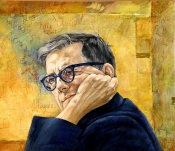
Dmitry Shostakovich – “the last composer, who created concepts of profound effect in music”
September 25, 2019 marks the 113th anniversary of the birth of Dmitry Shostakovich (1906–1975), the great Russian and Soviet composer, who was destined to become one of the world's most performed authors and a creator of Symphony No.7 (known as Leningrad Symphony) - the musical symbol of heroism of Leningrad during the siege. The Presidential Library’s portal provides access to the electronic copy of the original score of the symphony and the Symphony No. 7 programme of August 9, 1942 – the day when the piece was performed for the first time in besieged Leningrad.
Dmitry Shostakovich was 13 when he entered the Petrograd Conservatoire, which was regarded as the best in the country. At the age of 19 he composed his first symphony. The music was well received by contemporaries: it was unusually fresh, full of hopes and youthful optimism.
Few composers were as famous as he was during their lifetime. People's Artist of the USSR, Merited Artist of the RSFSR, laureate of the Lenin and State prizes of the USSR. Moreover, there was a long list of foreign awards and diplomas, honorary titles of many universities and musical societies in Great Britain, Austria, Finland, the USA...
The composer experimented a lot, most of all he was afraid of being trivial. In 1932, after a series of astonishing avant-garde compositions, he wrote his famous opera Lady Macbeth of the Mtsensk District (Katerina Izmailova).
The Shostakovich family was in Leningrad when the war broke out. The ring of the siege was slowly closing. For a long time the composer disagreed with the decision of authorities to evacuate him and his relatives. He worked on the Symphony No. 7 at that time, which was completed and performed for the first time in Kuybyshev. In Russia and in many countries of the world it was seen as the greatest symbol of the fight against fascism.
Ahead of the first performance of the symphony in besieged Leningrad, commander of the Leningrad Front L. A. Govorov ordered to fire at the enemy’s artillery so that the cannonade would not interfere with the performance of Shostakovich’s work. The digitized collection of Leningradskaya Pravda newspaper issues published during the Great Patriotic War features the issue of August 7, 1942. It spotlights the preparation for the performance of Symphony No.7, a long-awaited event in the besieged city. On that special day, the Leningrad Radio Orchestra was conducted by Karl Eliasberg. The newspaper reads in part: “We are through with the preparatory work. The score of the Symphony No. 7 is written for the doubled orchestra. Musicians from the army orchestras have joined the work on the symphony”.
The premiere of the Symphony No. 7 by Dmitry Shostakovich in the besieged city took place 77 years ago - on August 9, 1942, in the Grand Philharmonic Hall, which is named after the composer.
Under the agreement with the St. Petersburg Academic Philharmonia, the performance of the Symphony No. 7 (Leningrad) was recorded in the Grand Hall on September 14, 2017. The library’s specialists processed the video recording of the concert, which was then given to the Philharmonia. It also entered the Presidential Library’s collections.
In January 2018 as part of the cooperation with the National Media Group focused on historical memory preservation, the score of the Symphony No. 7 was provided by representatives of the Radio House to the Presidential Library for digitization. The video available on the library’s portal spotlights this event.
After the war, Shostakovich continued to write symphonies and composed different works, including songs: merry and cheerful, like The Song about the Counterplan, which was popular at that time; psychologically contrasting and deep, like the music for the film Hamlet directed by Grigory Kozintsev, which became an adequate expression of the ethical essence of the Shakespearean tragedy.
Dmitry Shostakovich passed away in Moscow in 1975.

